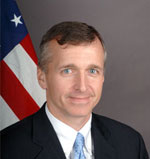

 字體:小 中 大
字體:小 中 大 |
|
|
|
| 2007/12/13 14:16:47瀏覽351|回應0|推薦3 | |
Thomas Christensen, Deputy Assistant Secretary for East Asian Affairs Thanks for coming to this roundtable today. I'd like to deliver a brief statement before we start, after which I'll welcome your questions. The relationship between Taiwan and the United States generally remains very close and friendly, but there has been a set of issues over the last several months on which we have disagreed. Before I describe those differences, I'd just like to take an opportunity to restate our abiding aim, the United States' abiding goal in the region, which is to foster stable and peaceful relations across the Taiwan Strait. DEPUTY ASSISTANT SECRETARY CHRISTENSEN: We're opposed to unilateral moves to change the status quo by either side of the Taiwan Strait. Anything that makes Taiwan stronger and safer is good for the United States and good for the people of Taiwan. Anything that places Taiwan's peace and stability at risk, on the other hand, also runs directly against the interests of the United States and, we believe, runs against the interests of the people of Taiwan. So while we continue to oppose the use of force in the in the Taiwan Strait, we look to Taiwan's leaders to leaders to adopt policies toward cross-Strait relations that combine strength with moderation. That's why we've expressed publicly and privately our special concern over the pursuit of a referendum on UN membership in the name of Taiwan. This referendum appears designed to pursue a unilateral change in the status quo. Moreover, aspects of the referendum appear inconsistent with President Chen's inaugural pledges, which we see as pillars of stability in cross-Strait relations. As we've said in the past, we believe that the DPP referendum as currently worded is inconsistent with President Chen's pledges - his pledge not to pursue name-change during his term of office. President Chen, in his inaugural pledges, also promised not pursue referenda on topics related to unification with the Mainland or Taiwan independence. So we're also concerned by his recent statements that imply that the UN referendum drive provides the Taiwan people an opportunity to accept or reject unification with the Mainland. The U.S. Government opposes the DPP UN referendum because, by unnecessarily provoking tensions in cross-Strait relations, it puts Taiwan's security -- and therefore U.S. interests -- at risk. This referendum cannot actually change Taiwan's status on the global stage. So it seems to promise the people of Taiwan international benefits on which it cannot deliver. The DPP referendum is unwise not only because it is provocative and dangerous, but also because it weakens rather than strengthens the hand of those who believe that Taiwan deserves a stronger role in world affairs. And I would include the United States in that group. We're not opposed to the use of referenda in Taiwan, and we most obviously are not opposed to democracy in Taiwan. We have been the biggest supporters of democracy in Taiwan. But when bad policies are being pursued through democratic means, it does not matter that the democratic means are in play if the policy is a damaging one. We reserve the right to speak out against damaging policies, regardless of whether democratic means are being used. The U.S. Government remains the steadfast partner of the people of Taiwan, as we have been for decades. We want the people of Taiwan to build on past successes in democratic development and economic growth, and we regret that we have to make on differences on the UN referendum in the name of Taiwan so plain. But we feel that we have a responsibility as friends of Taiwan to make very plain in a consistent, authoritative, and clear manner U.S. policy interests and U.S. policy concerns to our friends in Taiwan. We believe the people of Taiwan deserve no less from their friends in the United States. From: U.S. Departmentof State |
|
| ( 心情隨筆|單身日記 ) |










